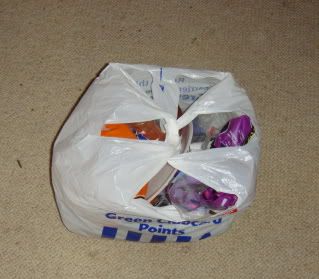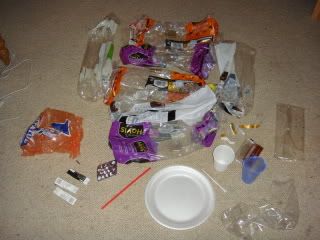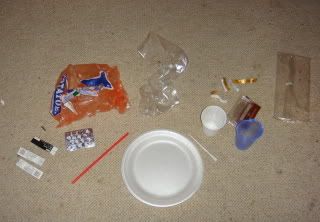As this is a fairly new blog I have some past things I would like to add retrospectively, and this is one of them. This is a 6 week experiment condensed into one single-serve backdated blog!
Last year we (Mr Organik and myself) jointly gave up plastic for lent. Well, kind of. Some friends of ours gave us the idea talking about some friends of theirs who did it last year, but apparently they stockpiled before lent! Well, we didn't stockpile as we only decided to do it the day before lent began (plus that would have been a real cheat and totally missed the point of what we were trying to achieve), but we did have a fair amount of stuff with plastic in and on in the house already (as we bulk buy a lot of produce going out of date). So we gave up the acquisition of plastic. As far as possible. The more we thought about it the harder we realised it would be - no crisps, chocolate, bought sandwiches, no bottles of water, no wrapped vegetables, no bags of salad, no yoghurts, no cheese... almost everything comes wrapped in plastic.
We gave ourselves 2 exceptions, one being bread which we didn't think we could get without plastic and I had never made bread and didn't think this was a good time to learn. And milk, because I drink soya milk we couldn't even get it delivered in glass bottles (if they even still do them) from the milkman anyway. But everything else was a no-go. At least we decided to see how long we lasted without having to buy plastic anyway!
Part way through the experience I found this experiment:
http://www.bbc.co.uk/blogs/monthwithoutplastic/2008/08/goodbye_plastic.html
She set herself similar rules to us, but being a journalist and that was effectively her job she was able to take it a bit more seriously than us.
I was challenged by someone saying that I could have bought paper wrapped bread from a bakery had I so chosen, which is indeed true, but here is the reasoning behind why we didn't do that:
-usually bread like that only lasts a couple of days at most. We wouldn't get through it all in a couple of days, so this would be an extra cost and an extra wastage (we keep our sliced bread in the freezer and just take out a slice or two as we need it)
-I couldn't really get to a greggs/bakery section etc every couple of days anyway. My hours are already pretty long, and I walk to and from work and don't go past any of those things. I wouldn't want to drive anywhere, that would defeat the environmentalist side of things.
-so yeah, I *could* get bread in a paper bag (not from asda though, their bakery stuff is in plastic!) but I would have a huge impact on my life, so I have written that one off from the start.
Mr Organik made some errors early on though, he ate some packaged biscuits in a meeting, and didn't realise till he ate them. He also had a coffee from one of those machines that uses a sachet thing because he hadn't taken a drink with him to work and was in meetings all day (hmmm!)
I turned down a cheap pot of lush gorgeous because it was in plastic. I didn't go for curry with people from work cause they put it in polystyrene. I also didn't buy the yoghurts in cardboard pots because they had plastic film lids.
I have come to the conclusion that this definitely wouldn't be sustainable long term, we were just curious really to see whether it's even possible, lent is only 6 weeks, just over.
Followers of my experiment were concerned about various things from washing up liquid to loo roll, detergent to moisturiser and butter to what on earth I put my vegetables in (most came from the local greengrocer who use paper, and the ones from the supermarket went in paper bags I took with me to put them in). The paper bags go in the compost bin once they have reached the end of their natural life.
On our first supermarket trip after lent began we were excited to find squash/cordial in glass bottles. I had hoped there might be, and I knew ribena used to come in glass, but there was actually quite a selection, and all sounded very exciting. They were clearly luxury items though, and priced as such, so we just bought 2 had to see squash as a luxury, having water the rest of the time (which we frequently do anyway).
I was also expecting cheese to be off the list because it invariably comes wrapped in plastic, but found one that was wax covered, and 2 in waxed paper and one camembert wrapped in waxed paper in a wooden box. Again, more expensive than the cheese we would normally have bought, but we had to consider it more of a luxury.
We bought 2 things that were made of plastic - one a birthday card with plastic wrap round it and one a gingerbread man kit which was in plastic as a present for the person the card is for. As these are to give away we decided it wasn't ideal, but didn't want to penalise our friend for our lent.
We found ourselves looking at all sorts of random things, "ooo, look you can get so and so in a tin" and that sort of thing just because they weren't in plastic, then wondering why as they were things that we didn't even want! We saw several boxes of pasta but they all had plastic windows in, so no pasta for the next month. We also saw a "no plastic in here" easter egg, and wondered whether it was a calling! We didn't buy it though
There was only one lot of toilet roll wrapped in paper - andrex 2 rolls, and there was only 1 packet left, luckily that was enough to last til easter!!
I did buy some pain killers. I was quite ill and decided lent would have to take a backseat to that!
It's a tricky issue. To rid ourselves entirely of plastic isn't necessarily the way forward anyway. For instance, the squash/cordial I bought in glass bottles required extra fuel compared with a plastic equivalent to get it to the shop because it is heavier. Yes it can be recycled, but so can plastic squash bottles. Which uses more energy to recycle? I don't know. I know we have an issue with glass recyclng in this country (UK) in general though which is most of the glass we take to be recycled is green (from wine bottles) and most of the glass we use here is white, so the green has to get shipped somewhere else. All very complicated.
Another example could be carrier bags. Plastic bags take a very long time to degrade in landfill, and are made from oil, and are only recycled in limited places. But if we were to replace all the plastic bags with paper bags that would be bad because paper in landfill decomposes anaerobically which produces methane which is a worse green house gas that carbon dioxide. So paper is only better if you compost it. And it's heavier, so again, more fuel to transport it, plus plastic bags take up less space in the dust cart/dustbin van so less vehicles are required, and they take up less space in landfill. I use cloth/hemp/jute bags for my shopping but then what if the person who made them didn't get paid a living wage? AAAARRRGGGH!!! It makes my head hurt!
Hence why in general I try to live the least waste route, but was just keen to try the not buying plastics thing for lent, just as a test to see how hard it was really. In general I would like to see less unnecessary plastics, but I am not sure whether ridding ourselves entirely of plastic is the answer either, not at the moment anyway. I would like to see easily recyclable plastics which can recycled energy efficiently. I also wish that the ethical conundrums were less clouded, I don't think even some of the top scientists could answer of the questions about which thing it is better to buy! How is the average man on the street supposed to know?!
Apparently "loose" fruit and veg at the supermarket actually have 4 times more packaging associated with them than packaged fruit. Even when you think you are doing the right thing you might not be. I think they like to keep us in the dark
I was also questioned about "ladies" products, but that will deserve a post all of its own. Rest assured though I do not use plastic in my feminine wear.
See the next post for the results of the plstic-free lent experiment





